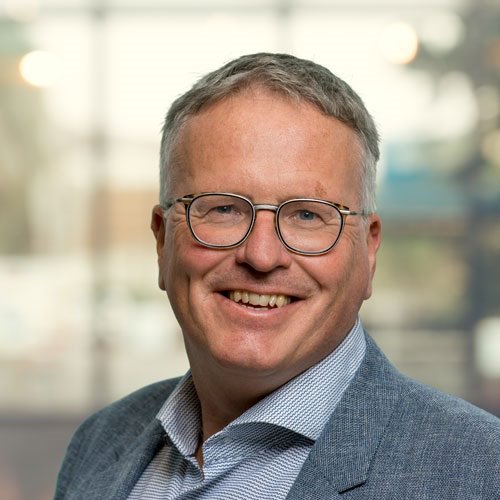
TNO 2025: Impact and growth through focus
In an FD interview, CEO Tjark Tjin-A-Tsoi talks about the importance of innovation, as well as the role and strategy of TNO.
With the wake-up call from Draghi’s report, the EU has once again been put on alert. Innovation is essential to safeguard our prosperity and security in the future, but also to address several complex, costly, and disruptive societal challenges. If we fail to do so, or do so inadequately, the gap with the US will widen, and we will be overtaken by China, both economically and geopolitically. Moreover, the transitions and the European socio-economic model will also be put at risk.
The Netherlands must shift from being a knowledge-based economy to an innovation-driven one. Excellent scientific publications and even start-ups and spin-offs are not sufficient. The challenging process of building internationally successful and competitive enterprises starts there.
And that is precisely where the Netherlands and the EU are relatively weak, as convincingly demonstrated by Draghi and others. The innovation chain falters, especially in the process steps following fundamental research. The so-called ‘valley of death’ is relatively deep and wide in the Netherlands and the EU due to various circumstances. This is mainly why R&D expenditures in the EU, and certainly in the Netherlands, lag far behind the target of 3% of GDP. That is, primarily the private expenditure lags behind.
According to Draghi, only 4 out of the 50 most prominent technology companies are from Europe. Such companies, in particular, are R&D big spenders. None of these European players has a valuation of 1 trillion or more, unlike several in the US.
It should also be noted that a majority of these 50 companies are only a few decades old. Think of Apple, Microsoft, Google, Amazon, Tesla, SpaceX, Nvidia, AMD, TSMC, and also ASML. Industrial and economic renewal not only requires the emergence of more start-ups but above all that a larger portion of them grow into new Dutch unicorns, the new ASMLs.
Where fundamental research benefits from a certain free and curiosity-driven approach, the subsequent steps in the innovation chain require a more focused and business-like approach. Certainly, a small country like the Netherlands cannot excel in everything. Focus based on a realistic and sometimes painful assessment of our relative strengths and weaknesses is therefore essential.
ASML also did not arise in a vacuum but emerged from the internationally already strong Philips ecosystem, with an early boost from the government. That same government has recently begun creating more focus with the National Technology Strategy (NTS), to which TNO has made a significant contribution. This policy will need to be further developed, refined, and implemented over the long term.
TNO is taking up this challenge and translating it into its own organisation in the new strategy. Some key elements are:
1. Focus
To maximise our impact, we must deploy our scarce resources as effectively as possible. In most cases, we operate in global markets where many other large players are active. It is therefore important to focus on areas where we have a ‘right to play’.
That is to say, fields and markets where we are clearly one of the leading players and where the (market) conditions and structure are favourable for the Netherlands. In these areas, the Dutch economy, R&D expenditures, and also TNO can grow further.
2. Science-to-market
As mentioned, innovation does not end with fundamental research or a publication in a scientific journal. Innovation has an impact only when it is applied and rolled out on a large scale in society. The “T” in TNO stands for “Applied”. At TNO, it should therefore be all about application. TNO will better support businesses and the government in these final implementation phases.
3. Start-up to unicorn
TNO will also take more active steps to address the faltering innovation chain. On the one hand, by starting innovative new enterprises (spin-offs) itself. This policy will be continued vigorously.
On the other hand, TNO will take a more active role in guiding and assisting these spin-offs, as well as other deep-tech start-ups, to rapid growth and success, often in collaboration with Venture Capital funds and InvestNL. This could even take the form of an investment by TNO. In this way, TNO will help make the valley of death less wide, deep, and deadly.
4. Subsidies and the valley of death
Subsidies from the government (NL or EU) can play an important role in bridging the valley of death. This can be through a financial boost when the market is not yet, or not quickly enough, willing to step in or initiate. It can also be by creating infrastructures that create long-term value for the entire innovation chain.
Ultimately, however, the goal is to emerge on the other side of the valley of death, to stand on our own two feet and conquer the world with impactful innovations. Subsidies should therefore primarily be seen as ‘impulse financing’. This way of thinking and working will be further developed within TNO in the coming years. This principle is broader than TNO, incidentally.
Get inspired
TNO and Quobly join forces to advance industrial-scale silicon quantum technology
Balancing skepticism and blind trust: critical thinking as the key to responsible and effective use of GenAI


Making sustainability strategies robust and resilient in an uncertain world

Sunlight-driven technology for sustainable chemistry and solar fuels


ACROSS: Can adaptive camouflage help make soldiers invisible to enemy detection?


